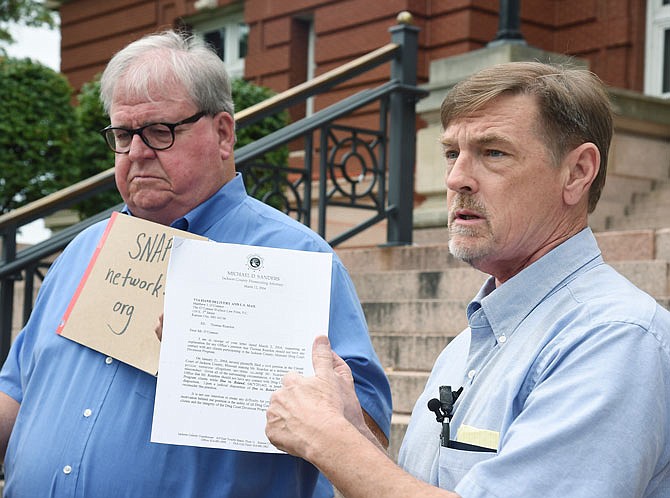Victims of Catholic clergy sexual abuse said Wednesday - like previous efforts to deal with the crisis - Missouri Attorney General Eric Schmitt's recently released report on abuse was woefully inadequate.
Members and supporters of the Survivors Network of those Abused by Priests held a news conference on the sidewalk outside Schmitt's Jefferson City office Wednesday afternoon to express their disappointment in the report, which they had awaited for more than a year.
David Clohessy, the former national director of SNAP, called on Schmitt's office to reveal whom it interviewed for the investigation.
"In this report, there is virtually no mention of corrupt church officials who conceal - and have concealed in the past - these crimes," Clohessy said. "Virtually no mention of several church-run treatment centers in Missouri that (over decades) have literally imported hundreds - if not thousands - of predator priests from other states. And virtually no mention of religious order priests, who comprise about one-third of the priests in America."
These are among the shortcomings that "plague this probe," he said.
Schmitt's office replied to the criticism in a statement it released following the news conference.
"Victims have a right to be angry over the actions of the Catholic Church and the church's wide-reaching cover up - in many instances, it has completely and totally upended their lives," the statement said. "We were both humbled by the victims' bravery in coming forward and deeply saddened by the stories of abuse and cover-up we heard. The Attorney General's Office sought to do a thorough, victim-centric, and independent investigation of allegations of abuse from the Roman Catholic Church."
SNAP has studied dozens of reports about clergy abuse from around the world - created by attorneys general, grand juries and special governmental bodies, Clohessy said.
"We have never seen a report as bad as this one - as deceptive and as unhelpful," Clohessy said. "Because of this report, Missourians may well be left with the impression that most of the crimes and cover-ups are in the past. We believe that is wrong, and we believe that's irresponsible."
The investigation began in August 2018, after the public received revelations about Cardinal Archbishop Theodore McCarrick, the former archbishop of Washington, D.C., who was suspended in July 2018 over allegations he had sexually abused seminary students and later retired. Less than a month later, a Pennsylvania grand jury released a report on clergy abuse across the state.
Within a few days, the Archdiocese of St. Louis asked then-Attorney General Josh Hawley to look into its clergy. Bishop W. Shawn McKnight of the Diocese of Jefferson City soon followed the lead.
After release of the report, McKnight shared a letter with Catholics in the local diocese. In the letter, he said Schmitt's office acknowledges the church's Charter for the Protection of Children and Young People, created in 2002, has been a catalyst for reforms that improved the church's responses to reports of abuse.
The bishop's staff continues to review the report and its recommendations, the letter said.
Following Wednesday's news conference, Clohessy took a letter and Sunshine Law request inside to present to Schmitt's office.
Within the letter, SNAP criticizes the report for ignoring "thousands of pages" of internal church documents that have been obtained by attorneys who represent abuse victims.
The request seeks any "memos of understanding" between the Attorney General's Office and the church and a through list of whom the office interviewed for the investigation (redacting victims' names).
Clohessy said it is clear the office did not seek out enough victims or alleged abusers.
"We went beyond our original mandate in this investigation, and we believe that is reflected in the report," the Attorney General's Office statement said. "The Attorney General's Office is moving forward with referring 12 former priests and clergy members for potential criminal prosecution and we stand ready to aid in those prosecutions, but we are open to receiving any additional information relating to the investigation."
Clohessy was critical of Schmitt for not looking at the men who covered up priests' abuses.
"What makes the Catholic crisis so enduring and so appalling is the complicity of the hierarchy - the bishops, the monsignors, the vicar generals - who even now minimize these crimes and cover up these crimes and move around these criminals," Clohessy said. "And for Schmitt to say that the men in charge of this institution - their wrongdoing is outside the scope of this investigation - we think is appalling. Especially because Schmitt offers no explanation or no rationale for that."

